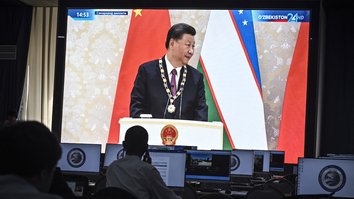ISLAMABAD -- A recent agreement for China to build another nuclear power plant in Pakistan has again raised concerns over Islamabad's massive debt to Beijing.
The two sides on June 20 signed a $4.8 billion agreement to set up a 1,200-megawatt nuclear power plant at Chashma in Mianwali district, Punjab province. It will be the seventh Chinese-built nuclear power plant in Pakistan.
"Work on the project will begin immediately," Prime Minister Shehbaz Sharif said on the state-run PTV news channel following the signing of the memorandum of understanding between representatives of the two countries in Islamabad.
"Investment from China in this project to the tune of $4.8 billion sends a message loud and clear that Pakistan is a place where Chinese companies and investors continue to show their trust and faith," he said.
![Members of a religious party in Dir district, Khyber Pakhtunkhwa, in May protest against record inflation and fiscal imbalances in the country. [Zarak Khan]](/cnmi_pf/images/2023/06/27/42736-pf_nuclear_plant_photo_2-585_329.jpg)
Members of a religious party in Dir district, Khyber Pakhtunkhwa, in May protest against record inflation and fiscal imbalances in the country. [Zarak Khan]
However, Sharif's government is facing record inflation, fiscal imbalances and reserves that barely cover a month's worth of imports -- and much of the problem stems from loans and financial agreements with China.
"Under the current circumstances, such as the impact of the COVID pandemic and natural disasters, Pakistan can seek debt restructuring from the bilateral creditors," Finance Minister Ishaq Dar told reporters after releasing the budget for the 2023–2024 financial year on June 10.
China is Pakistan's main creditor with a debt of about $27 billion, according to an April report by the United States Institute of Peace.
Other creditors include the World Bank ($18 billion), the Asian Development Bank ($15 billion), the Paris Club, a group of 22 major creditor countries, ($8.5 billion), and the International Monetary Fund (IMF) ($7.6 billion), the report said.
Islamabad expects Beijing to reschedule its debts and prevent a default, even if the IMF does not co-operate, an anonymous Pakistani official told Nikkei Asia June 12.
However, he conceded, "Currently, there is no indication that China will agree to Pakistan's request for rescheduling debt."
China has in the past ruled out any debt restructuring.
Chinese debt trap
The China-Pakistan Economic Corridor (CPEC), a Pakistani component of China's Belt and Road Initiative (BRI), has sparked criticism that it burdens Pakistan with debt and enables China to leverage "debt trap diplomacy".
"Cash-strapped Pakistan is already struggling to stave off a balance of payments crisis and despite it, it is signing new agreements with Beijing without realising its consequences," said Muhabbad Mubashir, a financial analyst mainly focusing on debts.
"Pakistan has become heavily indebted to China, leading to a loss of economic and political autonomy," he said.
He also criticised Pakistan's recent move to use Chinese currency to buy Russian crude oil and said that it will isolate the country globally.
"The cost and financing terms extended by Beijing for executing all CPEC-linked projects are too expensive and overly exploitative and overly favour China," an Islamabad-based economist who works with the Pakistani Ministry of Finance said on the condition of anonymity.
Beijing gives money to developing countries only to ensure maximum profit, he said.
He pointed to Main Line-1, a CPEC-linked major rail project in Pakistan, as a recent example in which Pakistan agreed to increase the amount it is borrowing from China.
Pakistan agreed to increase the cost of the project from $6.8 billion to $9.85 billion after Chinese negotiators termed the former cost figure as "unrealistic", according to officials.

![Representatives of the Pakistani and Chinese governments June 20 sign a $4.8 billion agreement in Islamabad to build a nuclear power plant in Chasma, Punjab province. [PTV]](/cnmi_pf/images/2023/06/27/42735-pf_nuclear_plant-585_329.jpg)






